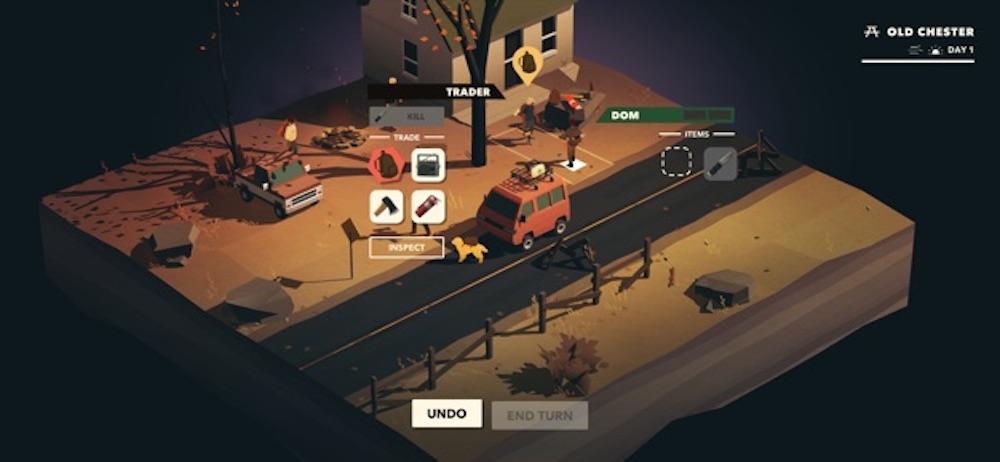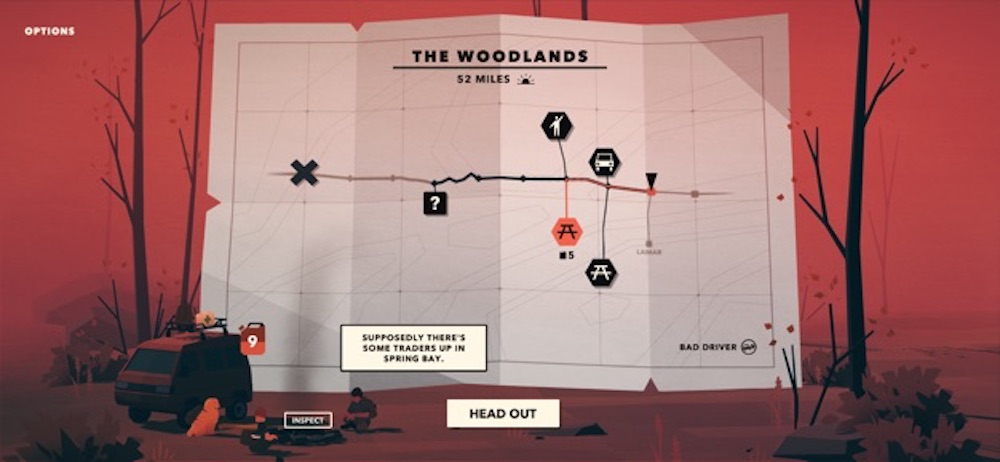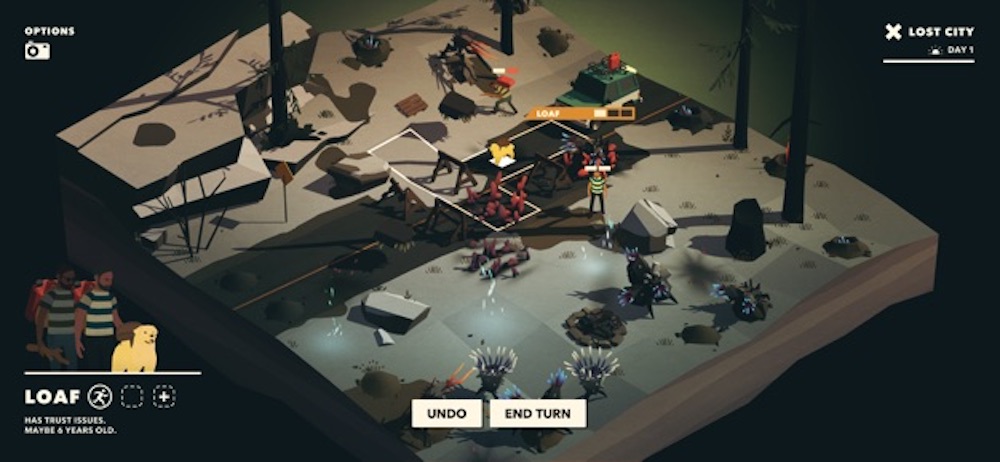Overland tasks players with surviving their way through an apocalyptic road trip, and it does its best to nail down a grim and hopeless mood through its game mechanics. It has taken the basic structure of a Tactical Strategy game and alters how players have to think about the challenges they face. Players will feel nervous, powerless and rushed as they’re forced to make calculated and callous decisions while navigating around monsters that have turned the world into an empty husk.
There’s a lot to appreciate in Overland. It’s too bad the game’s such a mess.
At the start of any game of Overland, players are presented with one character they control, a human (or well-trained dog) in distress, a crummy car, and a varied number of monsters, terrain obstacles, items and searchable containers. Immediately, they have a choice: do you take the time to save a potential ally, or do you scrounge for items that would make survival easier?
The tempting option is “both,” and sometimes that’s possible. However, Overland makes that choice risky, and often not worth it. Every turn spent in an area brings monsters closer to you, every noisy action threatens to attract more foes, and every injury, damaged vehicle, or misplaced item makes your team less effective at the game’s ultimate goal: grab what you can, get back to your car, and keep traveling west.

After fleeing an area, players get to choose where to drive next, and each location has the potential for tense, heart-pounding moments in increasingly-hopeless situations. It’s a grim atmosphere, and the game employs some clever ideas to make sure players never feel safe.
Humans, dogs and cars are all fragile. After one hit from an enemy, they’re barely able to move. A second hit kills them outright. The enemies themselves move slowly but steadily towards the characters every turn, blocking pathways and forcing players to work under constant pressure as they feel more and more boxed-in. Killing the creatures gets them out of the way, but each creature’s death rattle calls even more enemies to the surface, so too much reliance on violence will leave players with nowhere to run.
A sense of urgency fills each location — an impressive feat for strategy games, which usually encourage slow and methodical play. Bold and risky choices are the only rational moves if players want any hope of survival.
The tension is further raised by the game’s extremely-limited inventory system, which forces players to drop useful objects or juggle them between allies as they try to siphon gas and scrounge for weapons, flares and other equipment before escape becomes impossible. The best case scenario usually involves narrowly escaping unharmed, your car holding a few more gallons of gas, and one of your previously-unarmed allies now holding a dangerous-looking stick. Often, however, you end up having to abandon injured or trapped allies, or flee on foot after a lumbering beast dealt a destructive blow to your car.

The game’s mechanics excel at letting things quickly get out of hand. On one run, I’d grabbed a five-seat van and gathered a team of two women, a man, and a dog that the game randomly granted the ability to recruit any NPC it interacted with. After finding a standoffish man grabbing gas from abandoned vehicles, I couldn’t resist the temptation to form an entire Scooby Doo crew and sent my charismatic dog to convince the would-be Shaggy to join the team. Unfortunately, I left the van unguarded, so the Shaggy stand-in carjacked it, ran over my off-brand Velma, and made his way towards the exit.
In anger, I had Scooby attack the van, which blew it up and killed both the driver and the affable canine. Daphne and Fred didn’t make it far on foot, and I had to start the game over.
The game’s mix of chaos, cruelty, and cold calculus has the makings of a compelling experience, and the simple visuals manage to look good while adding a sense of mystery to the world and its varied, increasingly-unsettling creatures. Unfortunately, this solid core of a game is buried under some significant flaws, making it difficult to recommend.
While the game can be forgiven for some level of contrivance to increase the tension, some of the developer’s decisions strain believably. Vehicles, which can helpfully run down the game’s smaller creatures, can’t make U-turns, meaning that going backwards requires painfully backing up one a single square at a time. Between each level, characters stop to rest and talk to each other about what’s happening, but they can’t use their items during this time, leading to absurd situations such as an injured character sitting by a campfire and complaining that they need to find a medkit while one is fully in view, strapped to the back of their car.

On top of these gripes, the game doesn’t make much of an effort to explain its mechanics, leaving it up to the player to discover what they can and can’t do. That’s not bad design on its own — in fact, it helps add a sense of mystery and uncertainty to every new situation. For that design decision to work well, however, it requires a certain level of intuitive design and feedback that makes it clear what players can interact with. Overland lacks that, and instead relies on a series of clunky, frustrating-to-navigate menus that seem straight out of old 90s X-COM games and are poorly-suited for mobile.
To give an example, getting characters to drive a car requires selecting the character by tapping the images of the cast in the lower left of the screen over and over until the right one is selected (something that’s never outright explained), and then tapping on the car, then tapping “get in.” Of course, tapping “get in” doesn’t work if the trunk space is full and the character is carrying one of the items that they’re arbitrarily not allowed to bring into vehicles. After getting in, you’re allowed to move the car anywhere within range — unless you had previously exited a running vehicle, in which case you’d better remember to tap the vehicle again and choose the “drive” option, otherwise tapping anywhere in movement range will make the character run out of the car and into the dangerous streets. There’s thankfully an undo button that will let you fix those kinds of mistakes, but that button doesn’t work at night, which led to more than a few avoidable deaths.
To make things worse, I ran into some kind of bug that makes the game’s buttons less likely to register my taps the longer I played the game. Infuriatingly, tapping the buttons would still close the menus as though my actions were performed successfully. This made it hard to tell whether certain actions simply were not allowed, or whether I just needed to try the same action three or four more times before it finally took. It also meant I had to pay close attention to see whether I really had picked up the small rock on the road, otherwise I’d end up sending my guy into battle armed with nothing but his ineffective fists and proficiency for getting mauled to death.
It’s a shame that the game’s flaws detract so much from its innovations, because I’ve never seen a strategy game that feels as tense as Overland, and I was always compelled as I slowly unlocked its mysteries. But each time I died and had to start over, I found myself wanting to restart less and less, frustrated at how tedious, buggy, and poorly-streamlined the game turned out to be.
We pride ourselves on delivering quality, long-form articles like this one instead of the SEO-driven click bait that is slowly taking over the internet. Unfortunately, articles like these rarely generate the traffic (and as a result, the ad revenue) of listicles, cheat guides, and other junk.
Please help us continue producing content like this by supporting TouchArcade on Patreon, doing your Amazon shopping by first visiting toucharcade.com/amazon, and/or making one-time contributions via PayPal.
NOTE: Overland is available exclusively as part of Apple Arcade, a premium gaming subscription service from Apple. Without being a subscriber to Apple Arcade you cannot download and play this game. Apple Arcade is $4.99 per month and does come with a free one month trial, you can learn more about it on Apple’s official website or by visiting our dedicated Apple Arcade forum.